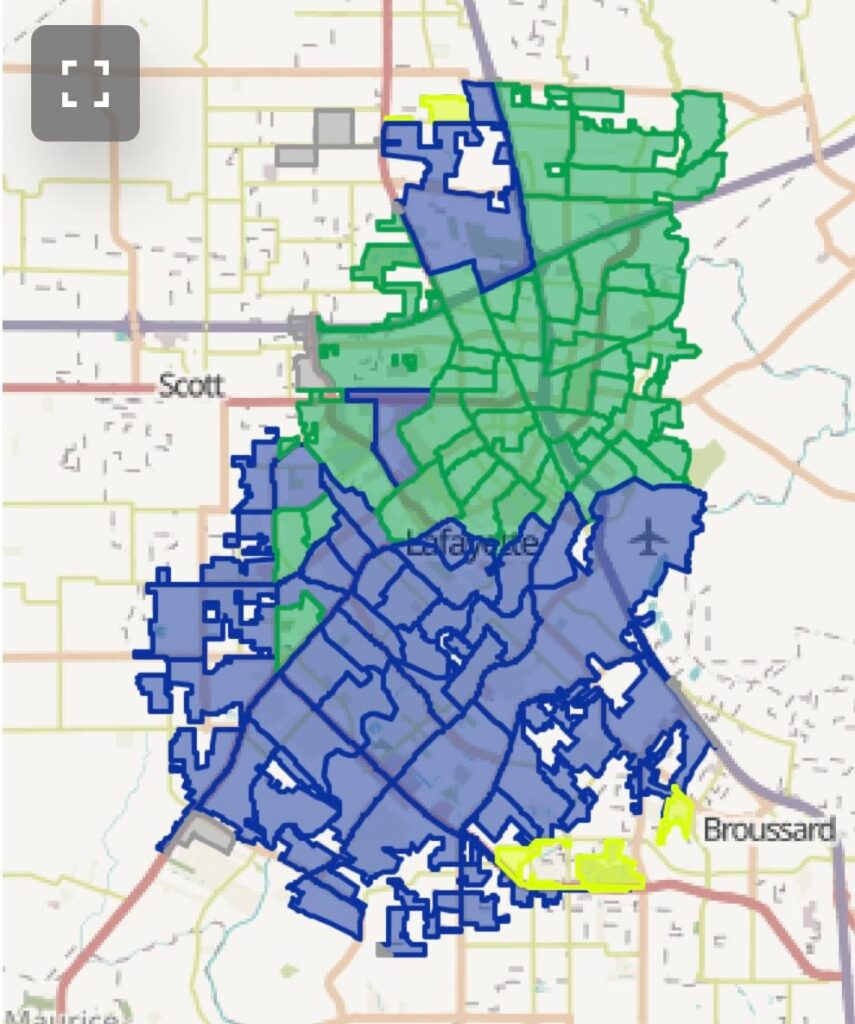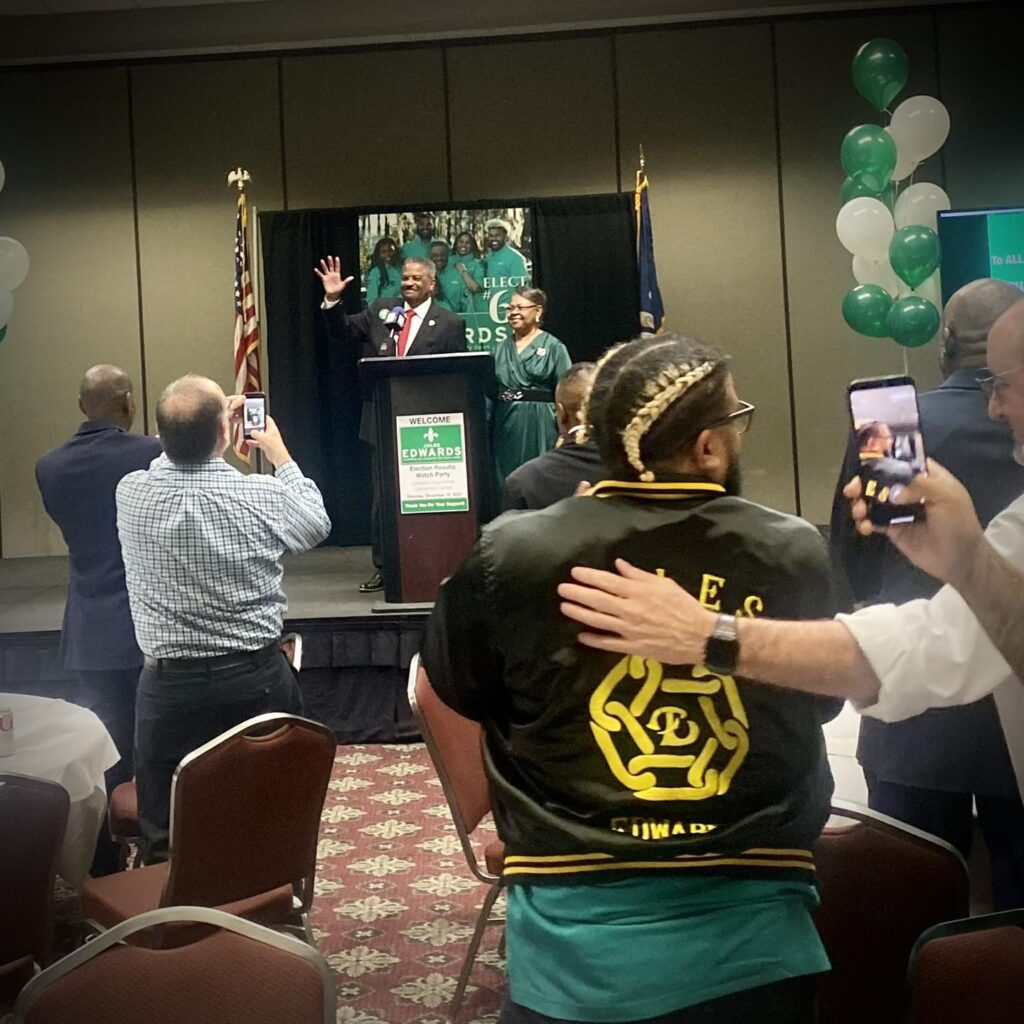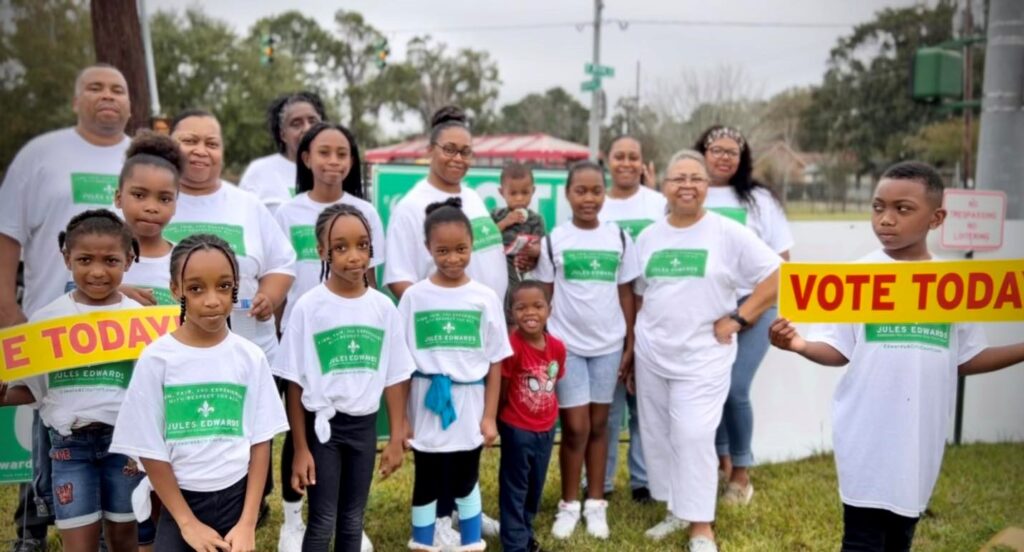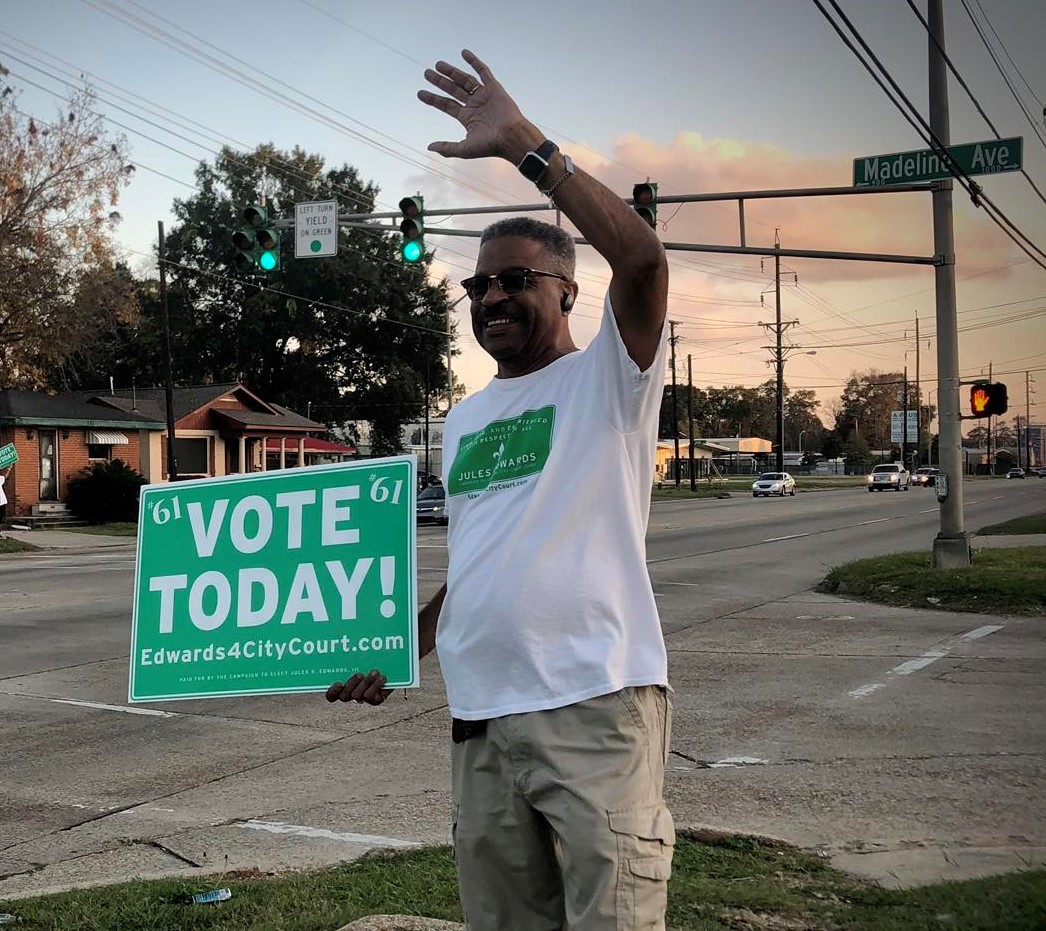Judge Jules Edwards III won the December 10, 2022, runoff election for Lafayette City Court with 52% of the vote to Roya Boustany’s 48%. He recently shared with Covenant Spotlight his thoughts on campaigning, party affiliation, ethnicity and the role of faith in a Lafayette election.
Lewis: You ran without party affiliation in a city that typically votes Republican, yet you still won. To what do you attribute your win in the runoff?
Edwards: My intention was to be not aligned with any organized political party. The folks that helped me with the campaign assert that Lafayette has an increasing population of people who identify as either independent or no party. I was able to reach them. They really were somewhat of the decisive factor.
Lewis: What did you do differently compared to your 2020 City Court campaign in which you lost?
Edwards: I believe that in this election cycle, primary and runoff, I was more effective at communicating my care for the community. I think in the past election I was more “just the facts” kind of guy-like Jack Webb on Dragnet. People were not able to really identify with me as a human being. Whereas in this last election, I let a little more of my personality show. I let people see that I put my pants on one leg at a time. I stood out on the corner waving signs. I let people know how much I care. I came to recognize that people don’t care how much you know until they know how much you care.
Lewis: How and by what mediums did you use to communicate this message and which ones were the most effective?
Edwards: We posted a lot of Facebook videos this cycle that we didn’t do and 2020. I think that was fairly effective. I let people know my fallibility, the kinds of things with which I have difficulty. People see me and believe that I am an extrovert. The reality is I’m a very shy person. I’m an introvert. I let people know that I have kind of difficulty in interpersonal communication skills. It takes a lot of effort for me to stand in front of a crowd and respond to questions and that sort of stuff.
Lewis: When did you come to the decision that you needed to show a more human side?
Edwards: As soon as I decided that I was going to give a second go at running when the position became vacant. It was clear to me that I really only had one message “Qualifications matters, experience matters.” I was the most qualified with the most experience. However, whatever it was, in 2020 I was not successful in delivering the message and the message was not received. I needed to do a better job of communicating with people. If my message is not received, it’s my fault. It’s nobody else’s fault. I wanted my words to be heard by the common person who is not a political junkie and not a lawyer.
Lewis: Can you give an example?
Edwards: People are struggling to make a living, to put food on the table. I decided to speak to their concerns. The one thing I think I harped on, much more this time than last time, is the reality that when people come to the courthouse, whatever their role is, whether they are a litigant, a lawyer or a witness, they are often afraid. So, I tried everything I could to let people know that my intention is to reduce that stress by providing them as much information as I can about what to expect on a given day in court.
Lewis: You mentioned Facebook. Were there any other mediums that you found to be effective in a citywide election?
Edwards: Instagram, television, and radio. Television was expensive and really only reached a certain segment of the population. The younger people don’t really watch television news. I’m not sure that the television was effective at getting the message to the under 65 crowd. Having said that, in the runoff, it was largely the over 55 folks who participated in the election.
Lewis: How effective was personal door to door campaigning and appearances at public forums in the overall success of the campaign?
Edwards: Well, I think the public forums were really crucial. People had an opportunity to see all of the candidates side by side at the same time to make a comparison. I think that allowed me to demonstrate the benefits of experience and qualifications. Door to door is necessary, but was not time effective. Going door to doors takes a lot of time. For the vast majority, nobody is home or they refuse to answer the door. So, I’m leaving literature at the door. The reality is, though, voters like to see you working for the position by going door to door. People really appreciate the fact that you came and talk to them. People who are driving by seeing you going door to door appreciate that the candidate is making that effort. It is very valuable and I think voters will frown upon candidates who don’t do the door to door. But, it really is one of the least effective ways to persuade people.
Lewis: How did you decide in which neighborhoods to walk?
Edwards: We kind of bounced around. We didn’t walk an entire precinct. We’d walk on a portion of a precinct on the north side and a precinct on the south side. This created the appearance that we were everywhere. As we walked, we were putting up signs that had the effect of showing a growing momentum. I think the mailers [campaign mailed cards] are more effective in informing people there is an election going on and to actually go out and vote though we really didn’t send out mailers until the runoff. We also did use robotexts on election day reminding people today is the day to vote.
Lewis: Who do you think your key constituencies were? What kind of coalition does it take to build a successful campaign in Lafayette?
Edwards: I had the philosophy that if there are two or three people standing together, I needed to talk to them. So, I was begging people to let me know of organizations that had meeting times that I could get in front of- Elks, the Kiwanis, the Rotary, all of that. If I heard of a meeting, I went to the meeting. If people saw me at the meeting, they may recognize that I was campaigning. From time to time, they’d let me speak or they wouldn’t let me speak. I had on either a campaign button or campaign shirt. If it was announced that Judge Edwards is in the room, that opened the door and allowed people to talk to me.
Lewis: Are there certain individuals that anyone running for city office should at least go have an audience with at the outset? If so, about how many are there in Lafayette?
Edwards: I think it’s very important to acknowledge the people in our community who are actively involved. So, that’s all office holders, that’s people that you read about in the paper, people who are actively participating in civic activities. You want to seek an audience with them because they are influencers. You want to acknowledge their activity in our community, express appreciation for the fact that they’re interested in improving our community and then share with them your thoughts on how to improve the community. You can ask them if there is anything that they can think of that would help you in achieving your goal and hope they share the goal. I think there are somewhere between 150 to 200 such influencers.
Lewis: What was your appreciation of your name recognition and the importance that name recognition plays in a Lafayette election?
Edwards: Name recognition is very important. During the 28 years that I was on the District Court, I ended up with a lot of press and a lot of controversial cases. People recognize the name Judge Jules Edwards. There’s a lot of people who did not have a personal relationship with me. They couldn’t tell you anything about me other than my having had military service or “he’s strict and firm”. It was my impression that people perceived me as being unapproachable, even though I was doing everything I could to be approachable. It was rare that I ever encountered somebody who was not familiar with Judge Jules Edwards
Lewis: For somebody that would aspire to public office citywide in Lafayette that lacked name recognition, what kind of advice would you give them?
Edwards: I think you really need to get involved in civic activities. There are all sorts of volunteer activities that an individual can get in involved with that would develop that name recognition. Many years ago, before I was elected to the district bench, I participated in Leadership Lafayette and Leadership Louisiana. Those activities allowed me to get a better understanding of the kinds of institutions that exist in our community and what sort of services they provide. I learned the kinds of things that people were interested in working on and interested in improving. I was then able to pick amongst those various things to actually get involved and become known.
Lewis: Did you find any challenges running as a nonparty candidate?
Edwards: Yes, that was a big challenge. Lafayette is significantly a Republican town. The reality is whether it’s Democrats voting for Republicans or Democrats sitting out the election, Republicans are really motivated to vote for Republicans. I think I was able to explain to people that a trial court judge having no party affiliation makes sense because judges should not be attempting to achieve partisan goals. Nobody’s been able to explain to me the Republican way or the Democratic way to adjudicate a traffic ticket. I’ve been hearing more and more people say that the Republican Party has left them and they now consider themselves independent.

Lewis: In looking at a map of the precinct results in the general election, it seems like a north-south divide in Lafayette with you winning precincts in the north and Mrs. Boustany winning precincts south of Johnston Street. To what would you attribute that kind of divide in the precincts which were won by you versus won by your opponent?
Edwards: Well, I think it’s a little more subtle than what that map depicts. I think if you look at the individual precincts on the south side, I was very competitive in the south side. On the north side, I was decisive and won by significant margins on the north side. Though this was a low turnout election, somehow or another, I was able to motivate a larger percentage of the people who voted for me in the primary to vote again for me in the runoff. And, I convinced some people who did not vote for me in the primary to vote for me in the runoff. So, I really think it was just a matter of motivation. I hope that what motivated them was the message I was selling all along, which was “Experience matters”.
Lewis: Do you think race or party affiliation on both sides of the divide factored into how people voted?
Edwards: Yes, unfortunately we cannot get away from race in America. Race is something that is immediately recognizable. And, unfortunately, life consequences are affected by the perception of race. That is why I continue to say there’s really only one race which is the human race. We’re all created by God. We’re all endowed with the dignity that God gave each of us as a result of that creation. Unfortunately, humans sin, we miss the mark. We are very good at recognizing categories and treating people as us in them. We want justice for us and good government for them. It remains the reality and lens that many people see through, and that often guides their behavior. I’m doing my best to get us all to recognize that we are sons and daughters of God and we need to treat each other the way we have been commanded. We need to love God and love neighbor as we love ourselves but we first need to love ourselves to be able to go down that road.
Lewis: Were there any experiences during the campaign that made you think that someone was voting for or voting against you based on race?
Edwards: I was not able to make that determination. But, it is not an unusual occasion for me to have an experience in which I believe the other person is relating to me differently than they relate to white people. I think I have this experience less frequently than others because I have been recognized as “Judge Edwards.” I’m perceived as safer than the unknown, unrecognized black men. Regrettably, this requires many black parents to have “the talk” with their children and explain that, unfortunately in this world, people are going to treat them differently because of their ethnicity. These parents do this so their children can survive an encounter with someone who may mistreat them and to negotiate this world in which people treat others differently because of their ethnicity.
Lewis: What advice would you give a white candidate to successfully campaign in north Lafayette? And, conversely, what advice would you give a black candidate to successfully campaign in south Lafayette?
Edwards: It’s simply to make every effort possible to communicate that they recognize the inherent dignity of every human being and do not believe in any sort of hierarchy of human value. Every person has dignity and is entitled to be treated with respect.
It is an error to speak in terms of “colorblindness.” That really is not truthful. People who describe themselves as color blind intend to communicate that they do not use phenotypes to gauge the worth of an individual. But, that’s very different than saying I can’t see those phenotypes. I think it’s just simply better to be real truthful about the reality we live in.
Our culture exists today as the result of the beliefs, attitudes and behaviors of people who lived before us and transmitted those attitudes, beliefs and behaviors to their descendants. That’s socialization, that’s acculturation. Unless a candidate is aware of that historical development and take into consideration its effects on current life, they will be unable to convey that they truly believe in the inherent dignity of every person to be treated with respect. I think it’s the same message that needs to be communicated on the north side or on the south side.
Lewis: Did you find any particular challenges or benefits in being a man expressive of your Christian faith in campaigning and being a candidate in Lafayette?
Edwards: I am fairly surprised about how easy it has been for me to do communicate that I’m a man of faith. I try to behave in the way that I believe Jesus commanded me to behave. I let people know that I believe in the Triune God but I don’t compel others to do so. I think people are attracted to that kind of a good witness in that they see me reflecting love for others. They see the joy and the hope that I possess and want to share in it. The fact that I am known to be a person of faith allowed me to have a certain level of credibility when I was campaigning to faithful people. Pastors typically gave me a good reception. People who attend church typically gave me a good reception. On the flip side, people who are not particularly religious, knowing that I was not a person who compels religion, were able to hear me out and see that there was also a secular rationale for what I’m attempting to do.
Lewis: In a Lafayette campaign, what role does the organized church play and how do you make connections with local churches?
Edwards: I think a candidate needs to try to tap into all organizations, secular and religious. Now, in Lafayette, Louisiana, there are a lot more people who are religiously affiliated than in New York City, New York. The proportion of outreach that you have to engage in with the faith-based community in Lafayette is much more significant than in some other places. Congregations are different. It’s really a matter of making some kind of contact with some member of the church to see who you need to talk to.
Lewis: From the outside, the race looked relatively clean and positive, to what do you attribute it being a relatively clean race?
Edwards: I think each of the three candidates committed to having a relatively clean race. We communicated that to one another and our supporters multiple times at forums. Of course, there were some rogue supporters that went out and did things that the candidate had not authorized. I think we had three people of goodwill who wanted the best for our community, and we did the best we could to set that tone.
Lewis: How important was the endorsement of candidate Toby Aguillard after the general election? Do you feel like it resulted in votes going your way?

Edwards: I think it was very helpful. No doubt about it. Largely, I think it was vindication of my crucial point that a trial court judge should not really have a party affiliation. So, the fact that Toby, registered as a Republican, would endorse me, given my superior experience and qualifications, vindicated that argument. I think that was him authorizing his voters to vote their conscience.
Lewis: Was there any indication that his endorsement translated into votes?
Edwards: I don’t know. The people working with me think that a good number of Toby’s voters just sat out the runoff. Anecdotally, I know many people who voted for Toby in the primary that voted for me in the runoff. I know quite a few folks who voted for Roya in the primary who voted for me in the runoff, but that’s just anecdotal information. However, the marketing people who worked with me are confident that the independents did rush to me in the runoff.
Lewis: If a prospective candidate, a person of faith, comes to talk to you asking what it takes to win an election in Lafayette, what would you tell them?
Edwards: I would ask them why in the world do you want to do this? (laughs) You have to be committed to selfless service. Being employed by government is not as financially remunerative as being employed in the private sector. If you want to be an elected official, you are saying that you want to be able to work with people who are largely having lots of problems and work to resolve issues that they cannot resolve without the government’s assistance.
People feel very entitled to the public official’s time. People will expect you to appear at an awful lot of public meetings just so that you can be seen as being interested and involved in the community. You need to evaluate your position in life. If you have young kids, are you able to take the time away from what’s required to adequately parent your children so that you can attend to these public duties? In order to say “yes” to public service, you’re saying “no” to an awful lot of stuff.
Second, you need to decide what material difference your service will produce as compared to the other person running. Somebody entering politics is really going to make one of three promises: A promise to do something for you, a promise to do something to you, or, a promise not to do something to you. A candidate must, therefore, ask: what are their goals? is there a rational plan to achieve those goals? And, is that plan feasible?
So assuming you’ve gone through this analysis, then the next question is, how are you going to communicate your message?

Lewis: What are the practical necessities in getting one’s message out in a citywide election in Lafayette?
Edwards: Well, communications are very important. I have developed a newfound respect for the field of marketing. The capacity to draft the message and communicate a message that is transmitted and received as intended is what matters. Having somebody with good marketing skills is very, very important. Fundraising is obviously important. But, in this race, I didn’t raise as much as the other candidate. Having an organized base of volunteers is also very important. But, again, in this race, I think I had fewer volunteers than the other candidate.
Lewis: Why do you think you were still successful then?
Edwards: I put it in God’s hands. I can only do what I can do and said, “God, you’re going to have to do the rest.” (Laughs)

